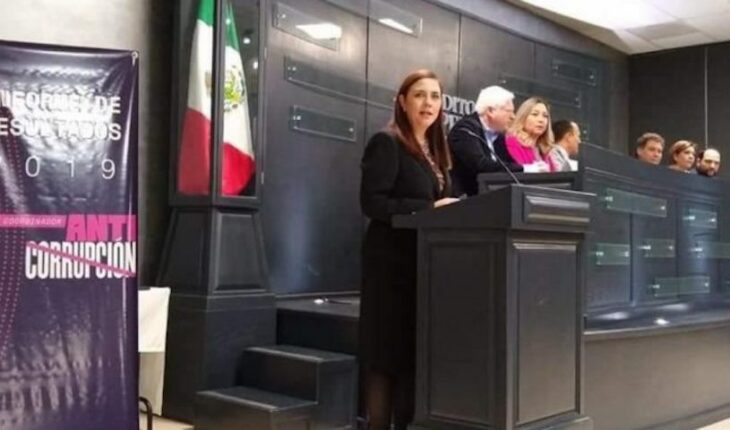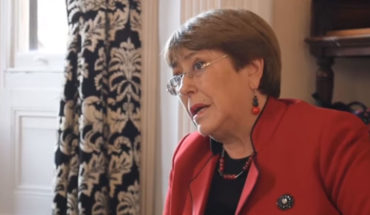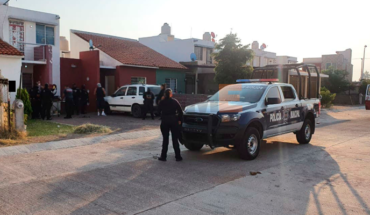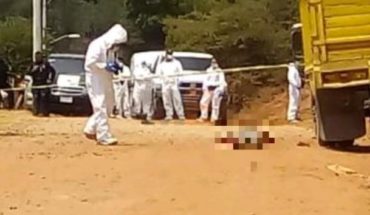In its three years of existence as an autonomous constitutional body, the Anti-Corruption Prosecutor’s Office of Chihuahua has had little success in punishing the misuse of resources by public servants, since it has only obtained five convictions in which the state managed to recover just over 5 million pesos from the treasury, according to official information from the institution of justice.
Recently, who had been appointed in 2019 head of the Anti-Corruption Prosecutor’s Office by the state Congress for a period of seven years, Gema Chávez Durán, suddenly presented her resignation from the position. Instead, Governor Maru Campos appointed Nidia Orpinel Pizarro as head of the office, in a procedure questioned because the route established in the Regulatory and Organic Law of the Anti-Corruption Prosecutor’s Office was not followed.
According to its latest Activity Report, from 2019 to 2021 the Prosecutor’s Office initiated 154 investigation folders, which, however, had little progress.
For example, during the 2021 fiscal year, the Prosecutor’s Office managed to get a judge to grant it only two requests for telephone interception and 42 requests for an investigation of fiscal and banking secrecy.
Of the 154 investigation files initiated, 69 were determined by the Public Prosecutor’s Office or a judge. This is not an achievement in itself, since, between 2019 and 2021, only 4 resulted in convictions, that is, 2.5% of the total inquiries opened in three years. The fifth judgment obtained corresponds to the year 2022.
In 25 of the specific folders, the non-prosecution of the criminal action was resolved; eight were found to be incompetent and seven invoked the power to refrain from investigating.
Let’s look at the detail of the folders that did lead to convictions. In 2020, in the only investigation that had that result, 252 thousand pesos were recovered for the repair of the damage. The remaining three correspond to 2021 and in them the recovery of 811 thousand 566 pesos was achieved.
That is, the three-year work of the Anti-Corruption Prosecutor’s Office reported to the Chihuahuas a recovery of 1 million 063 thousand 566 pesos.
The autonomous body also reported that in 2022, until before Chávez’s resignation, another conviction was obtained for the crime of aggravated embezzlement and a conditional suspension of the process, cases in which resources were recovered for 4.2 million pesos.
This media directly sought the former head of the Anti-Corruption Prosecutor’s Office to request a balance on her departure from the autonomous body, but did not respond to the request.
For activists and anti-corruption specialists, the ineffectiveness of this institution is a form of impunity.
“The judges sentence with reparation of the damage, and then give a sentence of three years, and this sentence in Chihuahua allows to reach a conditional sentence, that is to say that (those sentenced) do not have to step foot in jail. There is a double standard: people who have access to a good defense only have to repair the damage, and people who steal a thousand pesos have jail. Jail for the poor and reparation of harm for the rich. It is a double standard in the prosecution of justice, even with the same judges,” said René Moreno, a member of the Citizen Participation Committee of the State Anti-Corruption System.
“Historically, since the creation of the Anti-Corruption Prosecutor’s Office in Chihuahua, we have filed complaints in various cases concerning the previous administration of the municipal government of Juárez and we never saw any progress with the previous Prosecutor, Gema Chávez; moreover, there was great resistance to receiving the complaints that we presented, they did not want to receive them, they looked for any argument to try to send them to another place or make us desist from presenting them. Historically, the Prosecutor’s Office has had a political management, so autonomy has always been in question,” said Sergio Meza, executive director of the civil association Strategic Plan of Juárez.
Questioned relay
The now former prosecutor Chávez resigned from the position to which she was constitutionally elected when she still had four years to finish it. Anti-corruption specialists warned that the way the office manager was appointed violates the law.
According to the legislation, the absence of former prosecutor Chávez had to be covered by the head of the Deputy Prosecutor’s Office for Investigation and Trials, Ulises Soteno Torres, while a call was issued to elect the new Prosecutor. To do this, two-thirds of Congress must choose from a shortlist prepared with profiles proposed by anti-corruption specialists.
However, not even Deputy Prosecutor Sotehe did not assume the substitution nor has the call for a new selection process for anti-corruption prosecutors been issued. The Campos administration defends that the promotion of the deputy prosecutor is only foreseen in case of a “temporary absence” of the head of the Prosecutor’s Office, which did not happen in the case of Chávez, since he permanently resigned from the position.
In addition, the new office manager appointed by Governor Campos has been accused of being close to former Governor César Duarte. Orpinel Pizarro was appointed in 2014 by Duarte as District Attorney of the Central-South Zone of Chihuahua, and then, in 2016, the then governor appointed her Prosecutor of the South Zone. In both cases, the former PRI leader personally came to protest.
“This is an irregular procedure that leaves me thinking the worst: what is that person going to be able to do with that illegal appointment? Because we must remember that he has access to all the investigation folders on acts of corruption and that information is of all interest,” questions René Moreno, member of the Citizen Participation Committee of the State Anti-Corruption System of Chihuahua.
“With this change that is taking place (in the Prosecutor’s Office) a process that is established is being violated; the governor is overlooking that process and that makes us think that there is no real will to make the Anti-Corruption System in Chihuahua work; we have not seen a will either in the past administration (of Corral) or in this one that the system pulls, and a sample is precisely this designation, “warns Sergio Meza, executive director of the civil association Strategic Plan of Juárez.
They accuse pressures from the current administration
One of the most relevant investigations of former prosecutor Chávez was a folder initiated against the current governor, Maru Campos, for alleged acts of corruption committed during her tenure as mayor of the city of Chihuahua.
In 2020, the Anti-Corruption Prosecutor’s Office accused Campos of bribery and improper use of powers and powers for allegedly having received monthly payments of more than 1.3 million pesos from contractors of the City Council between 2017 and 2018, as he announced. Political Animal.
In addition, in that same period, he would have used a credit card belonging to a company in order to cover, month by month, personal expenses. The card was used in several cities in Mexico and the United States, Italy and France; the sum of positions attributed to the PAN candidate is around 1 million pesos.
Already in the campaign for the governorship, the legal defense of the PAN managed to defer several times the initial hearing of link to the process.
Campos Galván was already dragging by then another accusation of corruption related to the so-called “secret payroll”, in which allegedly, according to an investigation by the Attorney General’s Office (an organ dependent on the Executive and alien to the Anti-Corruption Prosecutor’s Office), he would have collected bribes from former Governor Duarte when she was deputy coordinator of the PAN caucus in the local Congress.
A few days after her inauguration as governor, in an unprecedented event, the Anti-Corruption Prosecutor’s Office dropped the accusation against Campos Galván for bribery and improper use of powers without ever being able to carry out the initial hearing.
The Prosecutor’s Office, which was still headed by Gema Chávez, explained that it made this request after three former officials who would have collaborated with Maru Campos in the alleged acts of corruption, and who served as witnesses of the ministerial authority under a criterion of opportunity, said goodbye to their statements against the PAN[ PAN[National Action Party].
In addition, the Prosecutor’s Office said it had heard new testimony from a “crucial witness” that casts doubt on the assumption that the governor-elect participated in the acts she was accused of.
Prosecutor Chávez’s decision was interpreted as meaning that the incoming administration had pressured her to “bend” it, or that she had “agreed” with Campos.
“It seems to me that there was an arrangement, it is difficult to believe that you are going to launch a folder with which you do not feel safe, because there are also criminal responsibilities for the Public Ministries that present folders without sufficient evidence, and the times imply that it seems that those folders were negotiated,” considers René Moreno.
They warn of political use of anti-corruption Prosecutor’s Office
For the specialists and activists interviewed, the brief history of the Chihuahua Anti-Corruption Prosecutor’s Office has shown that its work is dictated by the interests of the ongoing administration.
“We don’t see a willingness to fight corruption head-on. The Prosecutor’s Office, in the previous administration, did not workaba; for us, as a civil organization, it was very difficult. We are in Juárez, to go to put a complaint to Chihuahua you have to make a day between going and returning, we had to go to ratify it, and in reality there was a disinterest in giving attention to the complaints, and of the 4 or 5 complaints that we have there – all have to do with the municipal level, which is where we move– none has shown substantial progress,” denounces the director of The Strategic Plan of Juárez, Sergio Meza.
For his part, René Moreno is clear that a current government does not investigate itself, which calls into question the autonomy of the institution of law enforcement.
“Three of the five cases that have been sentenced have been from the administration from 2010 to 2016; it is as if nothing had happened in the past administration. That makes me question autonomy. Because the autonomy of a Prosecutor’s Office is that it starts to review the issues of the present,” he says in an interview.
“It strikes me that the corruption cases of the past administration have not been investigated during that administration, and again we return to political persecution. Now probably what is going to happen is that the cases that are going to begin to be pursued are those of the 2016-2021 administration (of Corral), and it is very likely that the corruption cases of the period 2021-2027 (of Campos) will not be touched until the next administration enters, and which fights corruption? It looks more like a political persecution in turns.”
Serio Meza considers that the barrage of the Campos government against Corral is a demonstration of the political interest that motivates the alleged fight against corruption.
“It is part of the political management of justice. All this that is happening, from the citizens we see that what continues to prevail is the interest and political management, either in the Duarte case, or as was done in the Maru Campos case and as the Corral case is happening: justice is totally politicized, partisan, there are no strong institutions, we have very weak institutions, and that goes against democracy, against the development of the state, it continues to affect the daily life of those who live in Chihuahua,” he criticizes.
What we do at Animal Político requires professional journalists, teamwork, dialogue with readers and something very important: independence. You can help us keep going. Be part of the team.
Subscribe to Animal Político, receive benefits and support free journalism.#YoSoyAnimal





